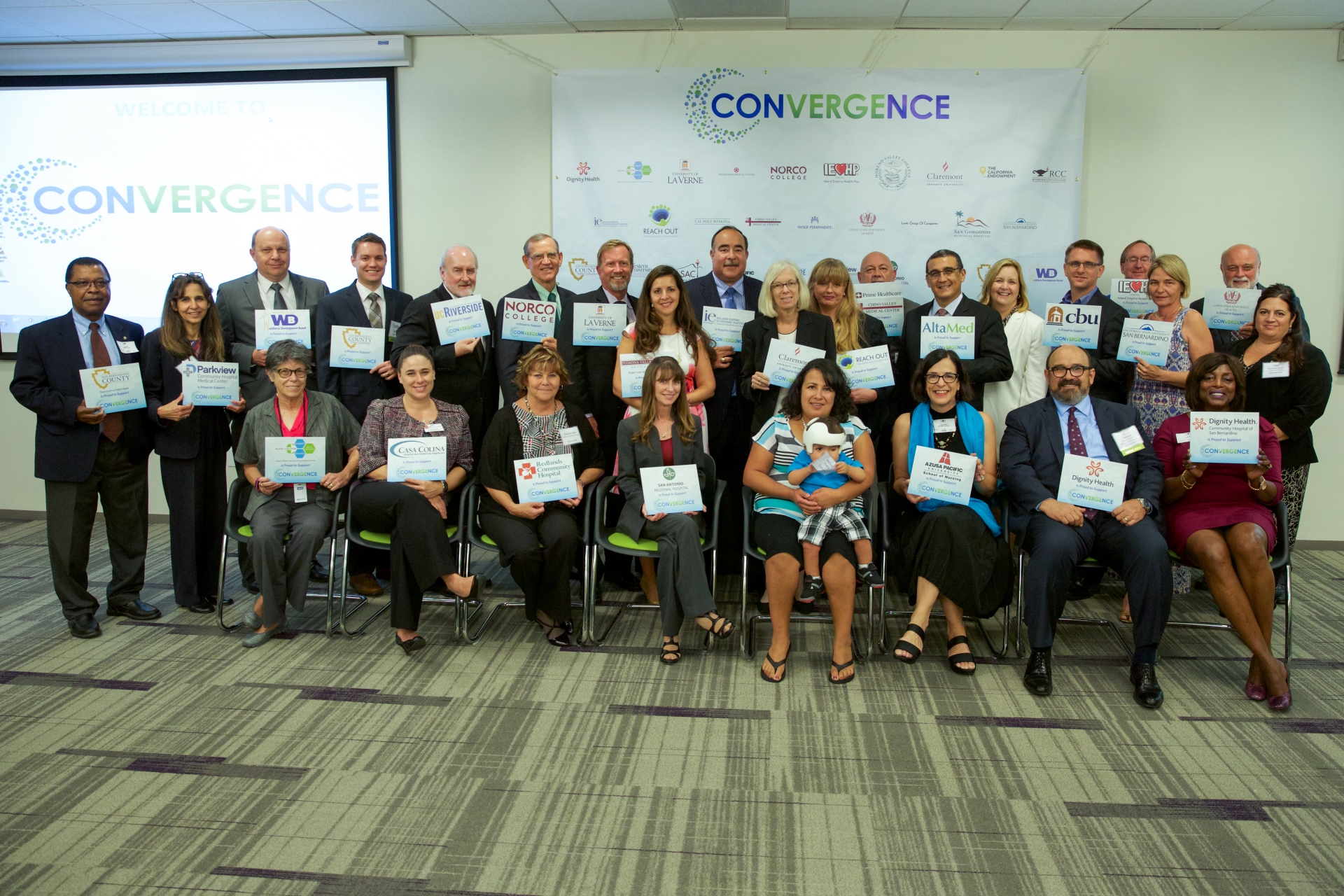Education, Health Care Leaders Unite to Boost Inland Health Jobs

More than 30 higher education and corporate leaders on Sept. 23 announced their commitment to establishing programs that produce a larger and more diverse medical workforce to serve Inland Southern California’s growing population. It is the largest initiative of its kind in the nation.
The Convergence Group serves San Bernardino and Riverside counties, as well as the Eastern San Gabriel Valley. It was started in 2013 by higher education and health industry leaders. Leading Convergence is University of La Verne President Devorah Lieberman and Deborah Freund, immediate past President of Claremont Graduate University. The announcement took place at Inland Empire Health Plan in Rancho Cucamonga.
“Convergence provides a united and strategic opportunity to meet the health and economic needs of Inland Southern California,” Lieberman said. “The physical and economic health of Inland Southern California is everyone’s business, and that is why this initiative resonates with so many partners. I anticipate that Convergence will become a national model for other regions in the country.”
The initiative focuses on five goals, including tracking and forecasting health workforce needs; policies to recruit locally; agreements to share courses and expertise among school districts and higher education institutions; developing a homegrown workforce campaign and focusing on diverse students.
Freund, considered an expert on healthcare financing, said Convergence is something the region has needed for many years.
“In 40 years in healthcare and higher education, I never have seen leaders in both sectors come together to collaborate in such an innovative and needed way,” Freund said.
Diana Fox, Inland Coalition chair and executive director of the community organization, Reach Out, said that making a big impact on health, economic and educational outcomes in the region starts with building a seamless pathway for students to join the health care industry.
“Convergence is a watershed moment for the residents of Inland Southern California as all the strong, committed partners put their full weight and effort behind growing a vibrant health workforce in a region that has long suffered with shortages, barriers to care, and a fast-growing population,” Fox said.
The need for Convergence stems from Inland Southern California’s growing and aging population, and an estimated 16,600 new health care jobs that will need to be filled by 2017. By 2020, Inland Empire residents who are at least 60 years old will account for 17 percent of the population, according to a 2011 study by Centers of Excellence. Shortages exist among primary care physicians specializing in elderly care.
Economic Modeling Specialists, Inc. data showed health care worker shortages in 2011 in positions such as nursing assistants, doctors and surgeons because not enough people obtained certification or degrees for those positions. The Inland Empire falls below the national average of registered nurses per 100,000 people, earning a “D” rating in 2010 by the California Institute for Nursing and Health Care. And the current workforce does not reflect the Inland Empire’s diverse population, with only 12 percent of registered nurses being Latino.
Paul Granillo, CEO of Inland Empire Economic Partnership, said collaboration across multiple community sectors will help to reverse these shortages and boost diversity within the workforce.
“I applaud the Convergence developers for including educators and business leaders in the conversation regarding the future of the medical field. Working across agency lines will go a long way toward ensuring prosperous futures, and inviting the business community to the table to assist is a crucial step.”
Wrightwood mother Melissa Evans – whose 17-month-old son, Hudson Leadley, has hydrocephalus – spoke at the kick-off event, saying she has been waiting for such a program. Evans currently makes a 160-mile roundtrip commute weekly to Children’s Hospital of Los Angeles to get her son treatment because there are not enough specialists in the Inland area to help him. Her son had to have brain surgery the day he was born due to the condition, which causes an accumulation of fluid in the brain.
“The possibility of having specialists closer to home is something that gives me hope,” Evans said. “I am glad Convergence is here to help my family and other families who are going through similar challenges.”


